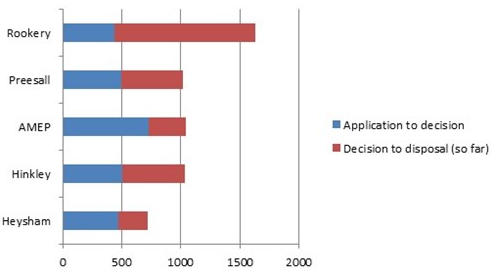NSIP judicial reviews drag on
 This entry reports on delays to consented (and refused) nationally significant infrastructure projects.
This entry reports on delays to consented (and refused) nationally significant infrastructure projects.
Once you have consent for your nationally significant infrastructure project (NSIP), it is not simply a case of starting to build your project. There will be conditions ('requirements') to discharge first, but if there is any sort of challenge, this is likely to double the time from making an application to having an implementable consent, particularly in the light of recent developments.
Only one project that had to go through 'post consent processes' didn't take too long about it and is now under construction: the Heysham to M6 Link Road in Lancashire. The application was made on 6 December 2011, and was consented on 19 March 2013. The consent was challenged by local group Transport Solutions for Lancaster and Morecambe (in the name of David Gate) and having been unsuccessful in the High Court, leave to appeal to the Court of Appeal was refused on 28 November 2013. That's 489 days from application to decision and only 254 days before the challenge was finally disposed of. Construction is now well under way.
None of the other four projects to have been decided but then subjected to challenges of one sort or another have been cleared to proceed yet.
The Hinkley Point C nuclear power station project was given consent on the same day as Heysham - 19 March 2013, but last week the Irish National Trust An Taisce sought leave to appeal to the Supreme Court on its point about likelihood of transboundary effects requiring consultation. The application was made on 31 October 2011 (505 days before the decision) and the legal challenge has taken 526 days so far.
The Able Marine Energy Park (AMEP) was given consent on 18 December 2013, but is subject to special parliamentary procedure (SPP), having been challenged in Parliament by rival port operator ABP. The next sitting date for the committee of MPs and peers considering the Development Consent Order (DCO) is 15 October. That is over 300 days since the decision was made.
The Preesall gas storage project was refused consent on 9 April 2013, but the refusal was successfully challenged in the High Court and is now being reconsidered, with the latest deadline for comments being 11 September. That deadline is 520 days since the decision, (it having taken 495 days from application to decision) and the new decision will be some time after that.
Finally, the Rookery South energy from waste project has been subject to both SPP and legal challenge. The application was the first to be accepted and was made on 5 August 2010. It was the only one to be decided by the Infrastructure Planning Commission and thus avoided a recommendation stage, taking a mere 434 days. A hollow saving indeed. I have been told that the legal challenge by rival waste company FCC Environmental, having been unsuccessful in the High Court, has been listed by the Court of Appeal for 25 January 2015. That is a round 1200 days since the decision was taken.
Here is a chart of the times taken in days:

All those judicial review challenges took place before the new Planning Court was set up as part of the High Court in April this year, which may well speed up challenges at that level. However, if they are appealed to the Court of Appeal, which most of them are being, then everything slows right down again. The Rookery challenge was heard in the High Court on 5 February 2014 and won't be heard in the Court of Appeal for nearly another year.
As far as SPP is concerned, the triggers for it have been reduced (including the removal of those that triggered the Rookery and AMEP SPPs) but not eliminated entirely. It would still happen if open space land is being taken and not adequately replaced under certain conditions, for example.
That is only five projects out of 21 to have been decided, so less than a quarter of the total. Most projects thus emerge unscathed, but if they are scathed, the effect on timescales is serious. Fast-tracking of the High Court will not have its desired effect if things slow back down again in the higher courts.